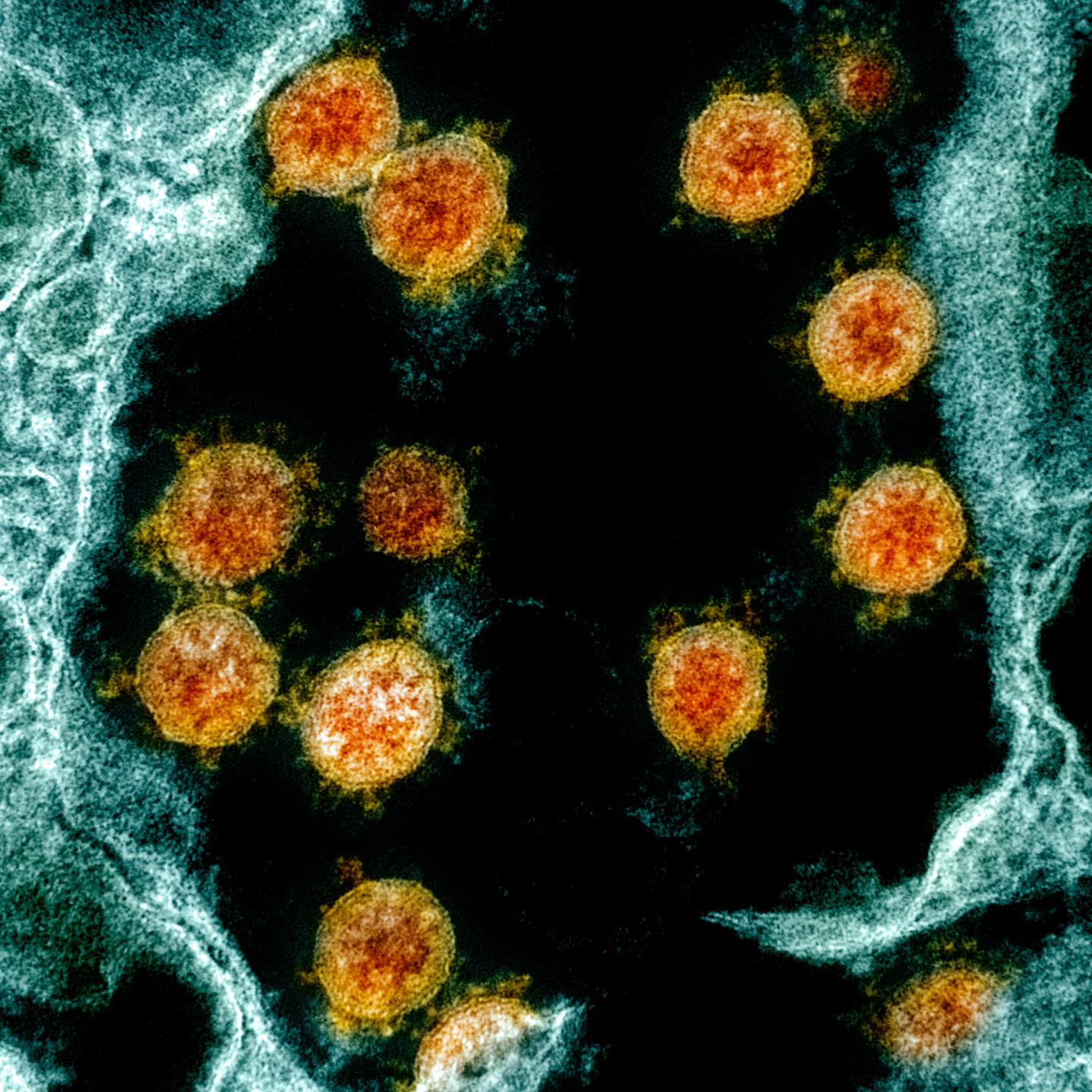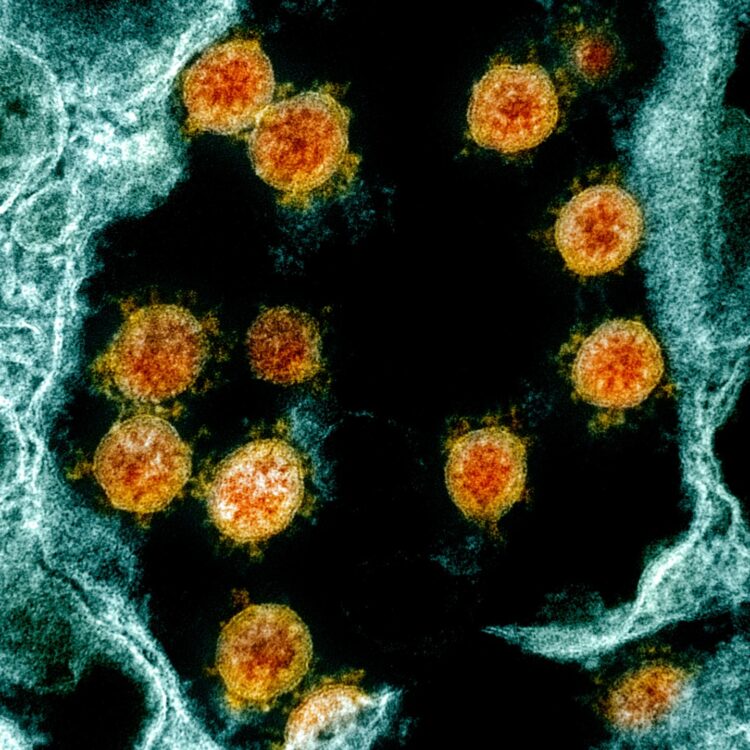Initial trial to determine if monoclonal antibodies can shorten severity of COVID-19 in outpatients

Credit: NIAID
A Phase 2 clinical trial will evaluate the safety and efficacy of potential new therapeutics for COVID-19, including an investigational therapeutic based on synthetic monoclonal antibodies (mAbs) to treat the disease. Researchers sponsored by the National Institute of Allergy and Infectious Diseases (NIAID), part of the National Institutes of Health, are working with clinical sites to identify potential patient volunteers currently infected with SARS-CoV-2, the virus which causes COVID-19, who have mild to moderate disease not requiring hospitalization. They will be invited to take an experimental therapy or a placebo as part of a rigorously designed randomized clinical trial. The trial, which is known as ACTIV-2, also may investigate other experimental therapeutics later under the same trial protocol.
If the investigational mAbs show promise, the study would expand from a Phase 2 to a Phase 3 trial to gather additional critical data from a larger pool of volunteers without delay. The trial will be led by the NIAID-funded AIDS Clinical Trials Group (ACTG) and will enroll participants at sites around the world.
ACTIV-2 was established as part of NIH’s Accelerating COVID-19 Therapeutic Interventions and Vaccines (ACTIV), a public-private partnership program instituted to speed development of the most promising treatments and vaccines. This study is also receiving support through Operation Warp Speed, the U.S. government’s multi-agency effort to develop, manufacture and distribute medical countermeasures to fight COVID-19.
The design of the study is adaptive to enable maximum flexibility in the shortest time frame. If the experimental treatment appears effective in the first stage, the treatment can be advanced rapidly to testing in larger groups of volunteers. The study also can be adapted to test additional therapeutics.
“We have seen encouraging, rapid results from other adaptive treatment trials for COVID-19,” said NIH Director Dr. Francis S. Collins, M.D., Ph.D. “Under ACTIV, specific therapeutics are being prioritized based on their likelihood for success. Prioritized therapeutics under ACTIV will use a master protocol that emphasizes flexibility, which enables these critical trials to be conducted without incurring delays when a treatment shows promise.”
The first therapeutic to be tested in this trial will be LY-CoV555, an investigational monoclonal antibody made by Eli Lilly and Company (Indianapolis, Indiana). LY-CoV555 emerged from Lilly’s collaboration with AbCellera Biologics (Vancouver, British Columbia). Antibodies are infection-fighting proteins produced by immune cells. So-called neutralizing antibodies target specific viruses or other pathogens. This antibody, which was discovered by AbCellera in collaboration with NIAID’s Vaccine Research Center, was isolated from a blood sample from a recovered COVID-19 patient. Copies of this antibody were then synthesized in a lab–the term “monoclonal” refers to these laboratory-manufactured antibodies.
“Using an antibody generated by the immune system of a recovered COVID-19 patient gives us a jump start on finding a safe and effective therapeutic,” said NIAID Director Anthony S. Fauci, M.D. “Investigating a variety of different therapeutics, including monoclonal antibodies, will help ensure that we advance towards an effective treatment for people suffering from COVID-19 disease as quickly as possible.”
The initial stage of the trial is designed to enroll approximately 220 volunteers who report recently experiencing symptoms of COVID-19 and who test positive for the virus but are not hospitalized. Once enrolled, they will be randomly assigned to one of two groups: 110 volunteers will receive an intravenous (IV) infusion of LY-CoV555, and 110 volunteers will receive a placebo infusion of a saline solution. The infusion takes approximately an hour to deliver, and volunteers will be observed afterwards to note any reactions.
Over the next 28 days, participants will attend a series of clinic or at-home visits by clinicians to track their COVID-19 symptoms. Investigators also will check whether RNA from SARS-CoV-2, can still be detected in participants’ noses and saliva using a standard nasopharyngeal swab. Because people with COVID-19 often have unusually low blood oxygen levels, participants will receive pulse oximetry tests to help determine if the investigational therapeutic has a positive effect on blood oxygen levels. They also will give blood samples to help researchers understand how the experimental therapeutics are functioning in their bodies, as well as whether they are affecting the course of their SARS-CoV-2 infection. Participants will receive additional follow-up for up to 24 weeks.
The primary goals of the Phase 2 trial are to evaluate safety, to see if the investigational therapeutic can reduce the duration of symptoms through study day 28, and to see if the investigational therapeutic can increase the proportion of participants with undetectable virus in nasopharyngeal swabs at specific time points. If there are no serious safety concerns and if the investigational therapeutic appears to meet other specific other criteria (such as sufficiently reducing the duration of symptoms or the viral load in the volunteers’ bodies), the trial will transition to Phase 3 and enroll up to 1,780 additional outpatient volunteers, for a total of 2,000 trial participants. The primary goal of the Phase 3 study will be to determine if the investigational therapeutic can prevent either hospitalization or death through study day 28 while also continuing to evaluate its safety. Participants in the Phase 3 portion of the study will not be provided nasopharyngeal swabs, though they will still perform self-collected anterior nasal swabs, and they will attend fewer clinic visits.
The study team is led by Protocol Chair Davey Smith, M.D., of the University of California, San Diego, David Wohl, M.D., of the University of North Carolina at Chapel Hill (UNC), and Kara W. Chew, M.D., and Eric S. Daar, M.D., both of the University of California, Los Angeles (UCLA),serve as protocol vice-chairs. The ACTG network is led by chair Judith Currier, M.D. (UCLA) and co-chair Joseph Eron, M.D. (UNC).
To ensure that the trial is being conducted in a safe and effective manner, an independent data and safety monitoring board will oversee the trial and periodically review the accumulating data.
###
NIAID conducts and supports research–at NIH, throughout the United States, and worldwide–to study the causes of infectious and immune-mediated diseases, and to develop better means of preventing, diagnosing and treating these illnesses. News releases, fact sheets and other NIAID-related materials are available on the NIAID website.
About the National Institutes of Health (NIH): NIH, the nation’s medical research agency, includes 27 Institutes and Centers and is a component of the U.S. Department of Health and Human Services. NIH is the primary federal agency conducting and supporting basic, clinical, and translational medical research, and is investigating the causes, treatments, and cures for both common and rare diseases. For more information about NIH and its programs, visit http://www.
Media Contact
Elizabeth Deatrick
[email protected]





